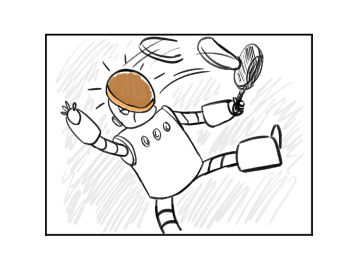
Shlimazl, Mazl, and the Stars
When Nomi affectionately calls Moby a “shlimazl” at the end of this lesson, she is using a term with a rich and complex meaning. Shlimazl, meaning bad luck or an unlucky person, is a Yiddish word whose etymological background brings together schlimm, “bad” in German, and mazl, “luck” in Hebrew. The word “mazl” also means “constellation,” and originally, wishes for good mazl were requests for aid from “a good constellation” -- that is, guidance from astrology and the stars. Shlimazl, then, has a ring of cosmic misfortune similar to English phrases like “star-crossed” or “born under an unlucky star,” and the word mazl itself entered Yiddish with a range of meanings including not just “luck” and “good fortune,” but also “fate,” “constellation,” and “sign of the zodiac.”
To further understand the similarities and differences between Yiddish mazl and English “luck,” it’s interesting to contrast two common phrases: “mazl-tov” -- literally “good mazl” -- translates as “congratulations” while “zol zayn mit mazl” -- literally “it should be with mazl” -- translates as “good luck”! So one is congratulated with good mazl, and wished luck with the hope that one will have mazl on their side.
Some students may recognize “shlimazl” from American Yiddish or even American English, where its meaning has become distinct from the word “shlemiel,” an incompetent or unlucky person. The famous image of a scene with spilled soup explains that a shlemiel is the one who spills the soup (he is incompetent) and then the soup lands on the shlimazl (he has bad luck). It is interesting to note that the word shlemiel is rarely used in Eastern Yiddish (the dialects spoken in Eastern Europe and which are the basis for contemporary Yiddish); rather it was used in Western Yiddish and was brought to America by German Jews. In America, the word found its way both into English and into the Yiddish of Eastern European immigrants.
Here are a few proverbs, and one humorous curse, with mazl or shlimazl:
Understanding mazl as luck (and shlimazl as bad luck, or a person with bad luck) is truly only the tip of the iceberg of this hard-to-translate concept. The next time you hope that all the stars align for someone on their endeavors, wish them zol zayn mit mazl -- may their efforts be with mazl!
